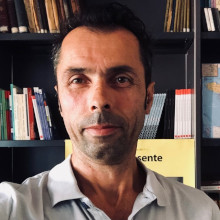What do you teach at Ca’ Foscari? What are your main research interests?
My name is Yannick Hamon. I come from France (University of Grenoble Alpes) and then from Emilia Romagna (University of Bologna, Forlì campus). I am mainly interested in teaching French as a Foreign Language (FLE). At Ca' Foscari, I hold French language courses for students in the Bachelor's degree programme as well as for students in the Master's degree programme in Comparative International Relations. My research focuses on the educational use of technologies for written production and translation, specifically in a cooperative perspective. I am also involved in teacher training and, for some time now, have been stepping out of my field a little to become more interested in political discourse analysis.
Tell us about your academic path.
I obtained a degree in modern literature in Clermont-Ferrand in France, then a first 5-year degree in teaching French as a foreign language, then, after a 4-month trip to Australia and New Zealand, I moved to Grenoble to obtain two Master's degrees (multimedia for language training and applied linguistics for language teaching). Moving further and further east, I obtained a PhD at the University of Bologna (DIT, Forlì campus) where I taught as an adjunct professor for another 5 years, before moving further east again... but I'll stop now, I swear :)
What are your professional role models / references?
I have many and they are all important in their own right. Instead of naming names, you will be able to identify them in this brief profile: people who, besides being brilliant in their field, are open, always curious, stimulating and at the same time rigorous in their methods: this skilful mix of rational, creative and emotional intelligence.
Have you always known that this was going to be your path?
I wouldn't say "always", but I knew it when I went back to school after leaving it at 17. I did my military service, I was a factory worker and while I worked I studied alone in books to reactivate my knowledge of English, history, literature. So I took an evening course to get my university entrance qualification. When I started my degree I was determined to go as far as possible. A PhD and research then became the number one goal.
What is the aspect of your research you are most passionate about?
The complexity of cognitive, metacognitive and emotional processes as well as how factors that come into play in the process of learning a language interact. The co-construction of knowledge in technological fields (which increase the complexity of these processes).
What does teaching and researching mean to you?
It means throwing oneself 100% into two complementary missions, useful both for the academic world - science - and for the initial training of future citizens. It also means being lucky enough to be able to study for a whole academic career, to grow as a brain but also as a human being and to help other people grow by passing on your own research, your passion, helping students ask themselves so many questions (and then find the right ones).
What has given you the greatest satisfaction in your career?
As far as teaching is concerned, the greatest satisfaction is a letter written by my students last year and addressed to the rector expressing their satisfaction with the way the French department handled the health emergency and remote lectures. A collective satisfaction, then. As for research, a convention I recently organised on environmental discourse analysis, for which I had a good response from participants and the audience.
The area you have always wanted to be involved in but have not yet had the opportunity to explore?
I would like to explore the field of teaching French literature. One day, one way or another, opportunities will open up, I am sure.
What would you say to young people starting their university career?
It is not an easy path and therefore more challenging. I suggest you don't make too many plans, leave doors open. Reflection and the ability to adjust your learning methods are very important. Doing sport and enjoying life, multiplying meetings, engaging in extracurricular activities can also make a difference. Becoming less and less academic, more and more flexible to adapt to new teachers, new methods. Ask yourself questions, but not always. Stay zen.
And to those approaching research today?
Stay open. As Umberto Eco advised us at the beginning of our PhD in Bologna, do not forget to be open to more disciplinary fields, more topics, more approaches. Work hard, too, and never give up on the heart of our studies: humanity in all its complexity, its nuances. Do not be afraid of challenges.
Why Ca’ Foscari and Venice?
Not only for the charm of the Most Serene and a spritz after an afternoon of teaching. Also, obviously and most importantly, for the University's impeccable reputation and prestige. Previously, I associated Ca' Foscari with their reputation for Eastern languages, but I discovered a great liveliness in Western languages too.

